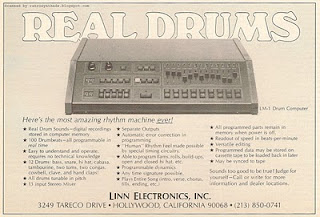Linn Electronics, Inc. LM-1 drum machine advertisement from page 34 of Contemporary Keyboard December 1980.
As alluded to in my last blog post on keytars (Casio AZ-1 advertisement), there are certain pieces of gear that make me think of summer, and in particular, summers in the 1980s. Well, the LM-1 definitely falls into that category, probably because hearing those sounds in songs from such bands as A-ha, Berlin, and Ultravox take me straight back to that decade.
This is probably the earliest LM-1 advertisement to be found in CK. It only ran once or twice in black and white before a new slightly different colour version of the advertisement came out that included a different 'Real Drums' font, the addition of an early Linn logo, and some changes to ad-copy formatting/placement.
Often when I first start an advertisement blog post, I will scribble down a few points about the advertisement on paper to get the brain juices flowing, and then do a bit of Googling to get some background research and ideas. I tell you this for a reason that will be come clear in just a moment.
My initial scribbles for this advertisement included these three points:
- No logo - booo!
- That's one crazy 'Real Drums' font
- Interesting contrast to have the 'real drums' text behind a decidedly non-real drum (ie: a drum machine)
But, back to the point.
You see, Eric was also the guy who designed THIS LM-1 advertisement back in 1980. And he designed other gear ads for companies such as 360 Systems, Akai, and Mitsubishi as well. He includes many of his ads in the 'Art' section of his Web site, complete with juicy commentary.
Here's what he has written for this LM-1 advertisement, and I've highlighted a part of it in bold:
"This unassuming little layout got the job done extremely well. And it did no harm, as many first-time ads do to new companies who naïvely publish silly, amateurish work and then spend years digging out from under the damage.
This was the very first ad for the Linn LM-1 Drum Computer. Roger Linn and I thought that the phrase “Real Drums” juxtaposed with a picture of something that looked decidedly unlike real drums would make for a provocative headline. Ad copy goes on to explain the LM-1 actually does play real drums, digital recordings stored in computer memory.
If you go back to my third little scribble, you will see that I also had initially pointed out the contrast between the title copy (Real Drums) and the image of the drum machine.
What is it that they say about great minds thinking alike... I kid. I kid. I don't make this comparison to try and come off as some kind of genius. Exactly the opposite.
The thing is, when I'm commenting on many of these ads, I'm doing it blind a lot of the time. I can make certain assumptions about why the creator of an ad might have used certain ad-copy or design elements in a certain way. But really, a lot of the time it's just an educated guess. Your interpretation may be totally different. I suppose that's what's cool about advertising art.
And that's why I really appreciate having someone like Eric Wrobbel take the time to document the ideas and processes that were involved in the creation of his ads. I find the best part of blogging is digging up the backstory - and sometimes the assumptions that you make turn out to be totally wrong.
Like when I tracked down Marco Alpert and the history behind Emu's 'Arthur C. Clarke' advertisement. Who new it would be such a simple explanation. But it was the journey that made it interesting.
It makes me appreciate these ads so much more. :o)


No comments:
Post a Comment